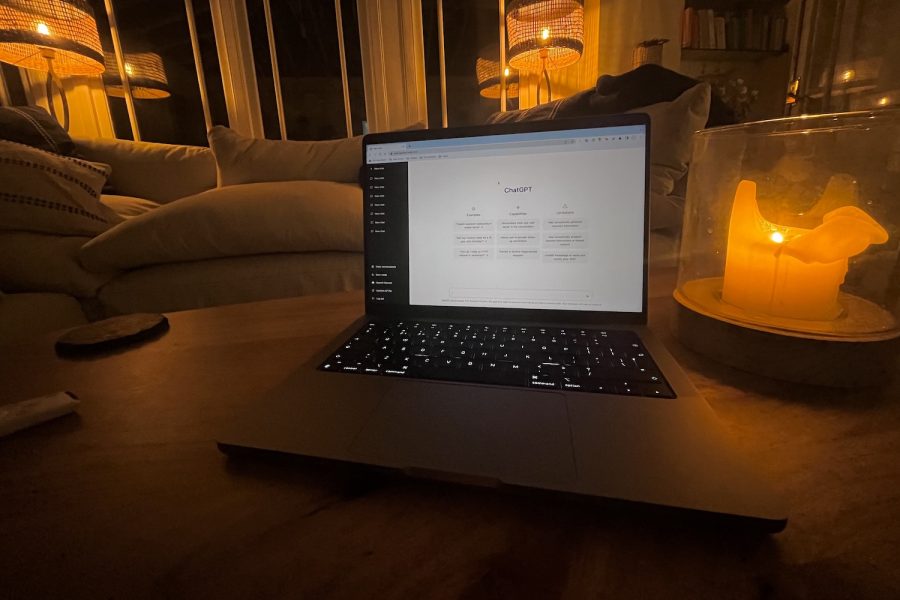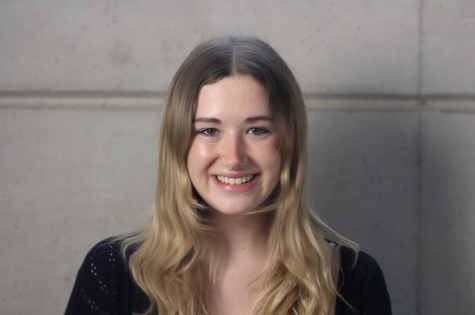Princeton University student Edward Tian recently developed GPTZero, a software detecting the use of ChatGPT technology in written text, according to NPR. This development carries potential implications for plagiarism detection and academic integrity.
ChatGPT has garnered widespread attention, and expectedly, it has become a source of chatter within the school community. The relatively new artificial intelligence software – to which users input information and obtain detailed, human-like responses within seconds – was released to the public Nov. 30.
Social Studies Teacher Aaron Fazzio said he deems ChatGPT the “highest quality” chatbot available to provide viable information to a mass of users.
Vica Sokoloff (’23), who has completed multiple computer science courses, said ChatGPT is a “huge step” in the development of artificial intelligence, and thus students should adapt their learning in tandem.
“The software will only become more powerful, so students should just be taught how to use it responsibly and in a productive way,” Sokoloff said.
According to OpenAI, ChatGPT formulates responses by scouring its database for the materials necessary to construct a response to a user’s questions.
Academic integrity
Matt Sherman (’23), who intends to major in computer science at university, said the availability of ChatGPT could enable academic dishonesty by providing text not generated by the student, but this risk is “dependent on the type of student” along with the course in question.
“For many classes, it’s not going to be really impactful,” Sherman said. “ChatGPT doesn’t have access to as many of the things that we have access to, so it’s not able to properly write essays or paragraphs based on those prompts.”
Fazzio said he echoes Sherman in that the limitations of the software inevitably guard against academic dishonesty.
“It’s not quite to the point where it will write a quality essay,” Fazzio said. “If students learn to use it as a tool just like you would a Google search or background information, it’s better than that, but not quite to the level of writing a full paper.”
Conversely, Lucy Ilyas (’26) said the software may encourage students to take shortcuts for written projects, particularly within the humanities.
“It can help give a brief outline or help organize your thoughts, and it’s unclear how it counts toward academic integrity,” Ilyas said.
Thus, Ilyas said teachers might increase their usage of plagiarism-checking software and screen monitoring.
Moreover, Sherman said faculty are limited in the prevention of cheating via ChatGPT, instead suggesting that teachers should “learn to adapt to it” as technology continues to evolve.
Educational impact
Computer Science Teacher Livia Piloto said ChatGPT should be likened to the invention of calculators and welcomed in education instead of banned outright.
“Mathematicians and math teachers were like, ‘Oh my god, this is doing all the work we’re teaching our kids to do,’” Piloto said. “If we were open-minded enough to use calculators and change the way we taught math, we should be open-minded enough to use artificial intelligence to change how we teach other subjects.”
Fazzio said artificial intelligence programs will “unforeseeably” transform the educational landscape for teachers and students alike.
“The evolutions of AI chatbot and of artificial intelligence will change my job and students’ jobs as much, if not more, than the internet,” Fazzio said. “The questions we ask our students will be different as AI evolves.”
The software will only become more powerful, so students should just be taught how to use it responsibly and in a productive way.
— Vica Sokoloff (’23)
Moreover, Fazzio said the development of programs such as ChatGPT will prompt a transition to a system evaluating the process instead of the final product, a marked change from the current educational system.
Even so, Sherman said he frequently draws on ChatGPT’s capabilities to further his understanding of artificial intelligence in his independent study, in which he tackles machine learning, algorithms and coding languages. One ChatGPT feature particularly useful to computer science learning is the software’s ability to identify errors in code.
“Whenever I get an error, my mentor and I sometimes take 10 or 15 minutes to go on the web and search for that error and figure out solutions,” Sherman said. “ChatGPT really helps me learn and just work through my problems.”
Piloto, who teaches Advanced Placement Computer Science classes, said ChatGPT has been a tool used in her lessons through discussion and news articles. She said her students explored ChatGPT through the lens of cybersecurity, unpacking how hackers may use the program to create viruses and spam emails that appear to be human-like.
Utility
Sherman said society is “racing the future” with the advancement of artificial intelligence, citing how programs such as ChatGPT could provide businesses with an unparalleled platform to bolster customer service.
“My dad currently works at Barclays Bank, and their app is jittery with customer service,” Sherman said. “If you went to ChatGPT and ask it a question, they would answer better than Barclays. More modern companies are trying to include this sort of AI to be able to answer the company’s questions and create a more fluid conversation with the user.”
If you went to ChatGPT and ask it a question, they would answer better than Barclays.
— Matthew Sherman ('23)
Further, Sherman said ChatGPT and other developments in artificial intelligence help equalize understanding for those who are less technologically inclined.
“The future of ChatGPT is going to help out older people that aren’t as tech-savvy along with younger people who just want to be able to learn and help them get a more expansive amount of knowledge,” Sherman said.
Ilyas said she echoes that ChatGPT’s utility is far-reaching, holding the potential to catalyze advancements in research.
“It’s a really powerful tool for technology beyond students writing essays or getting historical context,” Ilyas said.
In contrast, Sherman said ChatGPT removes the emphasis from learning and developing individual thoughts, skills and belief systems.
“The more that we get into AI, the higher of a chance we have at limiting people’s desire to learn,” Sherman said.
AI in human progress
Piloto said the development of ChatGPT and similar software will spur an evolution into becoming “better humans” with a greater emphasis placed on emotional intelligence. She said ChatGPT cannot extend the frontiers of human knowledge itself, as artificial intelligence relies on human databases formerly established.
“It is just artificial intelligence – it has no emotion or critical thinking that us humans have,” Piloto said. “We should center our education and behavior around critical thinking and human problem-solving.”
Fazzio said the advancement of artificial intelligence requires “critical thinking” about the pitfalls and advantages of technological development.
“Artificial intelligence is already impacting our lives in ways that most people don’t think of,” Fazzio said. “Whether it’s a TikTok algorithm or news media, we put ourselves into these boxes just based on choices we’ve clicked on. Asking a population in this modern context to consider both sides is very difficult.”
Piloto said the development of AI is indicative of human evolution and should be celebrated, not feared.
“None of this could exist without humans,” Piloto said. “That’s what people are scared of, that machines are going to take our jobs, but there will be new jobs and new industries.”
Ultimately, Fazzio said ChatGPT and other forms of artificial intelligence could exacerbate the current climate of instability while simultaneously advancing the human race.
“The cynical side of me says AI will lead to more polarization,” Fazzio said. “The hopeful side of me says it will lead to breakthroughs that the human mind would take significantly longer periods of time to figure out.”






